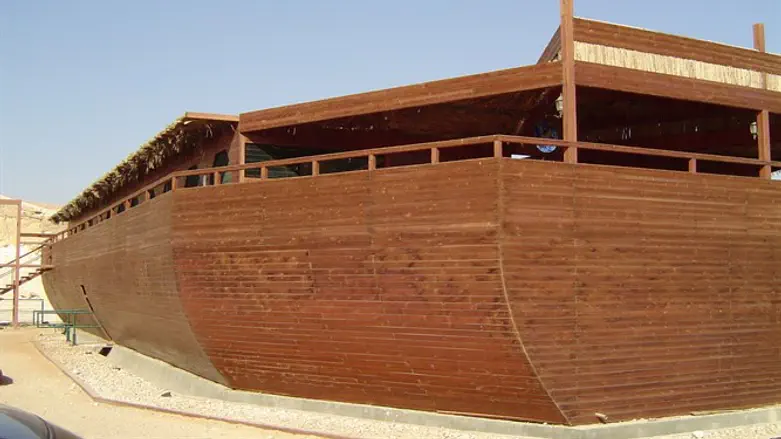
A wooden ark ( TEIVA) is used to save humanity. The choice of this TEIVA could not have been random and the message within that choice should not be ignored.
Noach lives in a generation wherein ” .. the earth was corrupt before God, and the earth became full of robbery ( Hamas) .. And God saw the earth, and behold it had become corrupted, for all flesh had corrupted its way on the earth.“( Genesis 6:11-12).The critical word here is ” it’s way”( et darko).The world had sunk into limitless selfishness and as a result had become morally corrupt and murderous.
Yet Noach was the beginning of the solution.”Noach was a righteous man he was wholehearted in his generations” .
The Torah tells us that Hashem commands Noach to "“Make thee an ark - A TEIVA of gopher wood; with rooms shalt thou make the ark, and shalt pitch it within and without with pitch.” (Genesis 6:14).
Our sages teach that the ark was built for 120 years, in order to allow mankind to be aroused to repentance during that time. Noach in his righteousness dutifully continued to build and prepare, despite the ridicule and abuse he may have endured.
Yet why an ark (a TEIVA)? The word Teiva is only used in one other situation in the Biblical text.
In the Torah portion of Shemot (Exodus) we begin to see the formation of a people. It was a time of great oppression.
“And Pharaoh charged all his people, saying: 'Every son that is born you shall cast into the river, and every daughter you shall save alive.”( Exodus 1:22)
It is at this very difficult time that we read of a marriage and birth. There is an immediate sense of something new and dramatic happening: “And the woman conceived, and bore a son; and when she saw him that he was good , she hid him three months."( ibid 2:2)
These words, ”she saw him that he was good” are not there by happenstance as they are the identical to words spoken by the Divine in the Creation of the world.
And God said: 'Let there be light.' And there was light. And God saw the light, that it was good…( Genesis 1:3-4).
The baby’s mother ,Yocheved ,was able to discern with the prophetic eyes that G-d always affords mothers , that a great illuminating light would come forth from this young infant. His future life would impact the world and illuminate the darkness. She realized that that light was in danger of being engulfed by a “flood” of hatred and fear.
She could not hide him any longer so she placed him a wicker basket, called a TEIVA in Hebrew. (Exodus 2:3).
The same concept of an ark ( TEIVA) again , taking individuals or an individual into a new and yet unrevealed destiny.
The TEIVA then is place of safety and refuge from a threatening and stormy world. There are times in our own lives that we need to find such a TEIVA in order to distance ourselves from a world mired in politically correct sameness and oppressive self righteousness.
While it is true that we were placed in this world to elevate it rather than separate from it, there are times when the separation becomes critical.
How does one go about creating such a safe place and sanctuary?
The Baal Shem tov points to the fact that word TEIVA also means WORD.
Words contain so much meaning, history in emotion. Yet at times, the choice of the right words, especially divinely inspired words can prove to be the ultimate TEIVA.
At times, when there is a sense of being engulfed in a flood of pain uncertainty and evil, words can be a refuge. This has been the case throughout the generation of this people’s walk through history.The study of Hashem's words on the one hand and the focus on our words in prayer has always been a place of safety. "You are my refuge and my shield; I have put my hope in your word."( psalm 119:114)
Yet there are two sides to this understanding of the word TEIVA.
One of the students of the Baal ShemTov, Reb Dov-Ber, the Maggid from Mezrich explained the following words of the text "You shall make a window TZOHAR for the ark TEIVA") Genesis 6:16) in the following way. The TZOHAR was a window or skylight. The use of that word was to teach us that we need to learn to add light into our words. Every word is a TEIVA. An ark or vessel filled with layers of meaning and shades of emotions. When we speak words we need to remember that Words are not harmless nor are they harmful.
Yet words have power. The world was created with words.
Relationships are built up with words. Our children discover themselves through word, theirs and ours. Words thrown about carelessly can foster hatred and can lead to the destruction of the temple, both spiritual and physical. Yet on the other hand words can create songs and words become the vessels of prayer.
We need to be aware of the words we use. We also need to ensure that they absorb and reflect light.
In times of impending floods , those words will serve as a protective TEIVA on the one hand . they can also be a shining light in the darkness that will surround us as well.
Lerefuat Kol HaPtzuim ve Hacholim
Lerefuat Yehudit bat Golda Yocheved and Yehudit bat Chaya Esther
